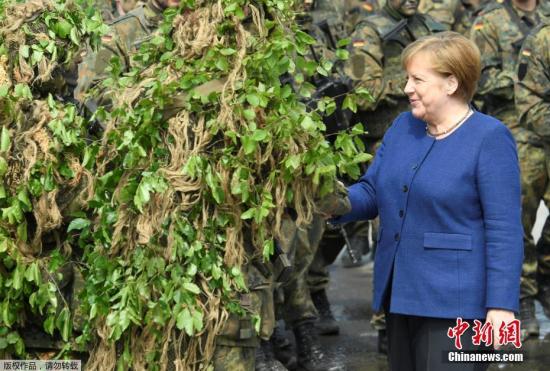China News Agency, Berlin, July 23 (Reporter Peng Dawei) German Chancellor Merkel attended the last summer press conference during his tenure on the 22nd.
She not only reviewed to reporters from various countries the five crises she led Germany to deal with during the 16 years in power, but also mentioned her regrets in dealing with climate change and refugee policies.
She also expressed her expectation that more women and people from the east will play a leading role in Germany in the future.
Data map: German Chancellor Merkel.
Photo by China News Agency reporter Peng Dawei
Merkel's "Farewell Press Conference" was selected in the Federal Press Conference Hall in the Berlin government district.
This is an association of German journalists independent of the government. It is responsible for organizing the regular press conferences of the German federal government three times a week.
As usual, Merkel attends the "Summer Press Conference" held by the agency every July or August to answer questions from German media and international media.
Since Germany is about to hold a general election at the end of September, and Merkel will no longer seek re-election, this means that theoretically the 22nd is the last time Merkel will concentrate on answering questions from reporters.
The German Chancellery referred to it as Merkel's "last summer press conference" facing the Berlin press in its press release that day.
When asked how to view the title of "Prime Minister of Crisis," Merkel said: "If there is no crisis in life, it will of course be easier, but when a crisis arises, it must be dealt with."
In Merkel's view, she led Germany to respond to five crises including the 2007 global financial crisis, the subsequent European debt crisis, the 2015 refugee crisis, climate change and the new crown epidemic.
"Only the domestic policies of a country cannot overcome the challenges we face. We can only overcome challenges as part of the international community, as we have shown on the climate issue-this is a revelation throughout my tenure." Kerr said.
Data map: German Chancellor Merkel.
On the issue of refugees, Merkel no longer showed the attitude of choosing to open the door to the country during the 2015 refugee crisis.
At the height of the European refugee crisis from 2015 to 2016, more than one million new refugees poured into Germany at one time, and the problems that it brought about continue to this day.
When asked whether Germany has a moral obligation to accept those who fled Afghanistan after the United States and NATO withdraw troops from Afghanistan, Merkel said that Germany has already accepted a lot of Afghan refugees, but she believes that it must do everything now. Everything can be done to achieve political peace talks in Afghanistan, so that the locals can live as peaceful a life as possible.
"Getting people to Germany will not solve all problems." Merkel also criticized the EU's failure to reach an agreement on a unified refugee policy so far.
She said that this must be resolved in the next few years.
Climate policy is a major focus of Chancellor Merkel's tenure.
She led Germany to withdraw from nuclear energy and implement energy transition, which played a key role in the evolution of Germany's climate policy.
But looking back on her work in the climate field, Merkel admitted frankly that in the sense of achieving the global temperature control target of two degrees Celsius, she “has not achieved enough results” during her tenure as prime minister, and must speed up in the future.
As the first Chancellor from Eastern Germany and the first female Chancellor, Merkel also talked about the integration of the East and the West after the reunification of Germany and the improvement of the status of women.
She said that her successor should also be sensitive to the life experiences of the people in the east, and she also hopes that more people from the east will play a leading role in the future.
Data map: German Chancellor Merkel.
Photo by China News Agency reporter Peng Dawei
Speaking of the advancement of women’s status, Merkel said frankly that Germany’s progress in this area is still slow, but fortunately, it has supported the advancement of women’s status by mandating that women must occupy a certain proportion in the core of political organizations and corporate boards. .
She laughed and said, "When I stepped into politics in 1990, I once imagined it all very easily."
Although the term of office is only more than two months, Merkel emphasized that the current government still has a lot of work to complete, such as the EU’s new "Fit for 55" draft climate law negotiations.
She said that the bill is very important to the next government and "we hope to achieve a good handover."
In fact, at the press conference, the "crisis prime minister" still did not forget the reconstruction work after the flood.
She also used this occasion to shout to the people to persuade people to actively vaccinate in response to the current rebound of the new crown epidemic, "the more people vaccinate, the closer we are to returning to freedom."
A reporter asked Merkel what she would miss when she stepped down as prime minister.
Merkel returned to the iconic simplicity:
"Only when you really leave, you will know what you miss. So this is a question for the future." (End)

